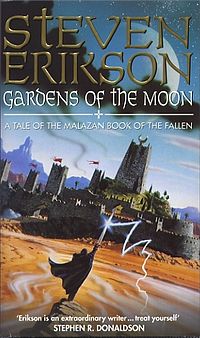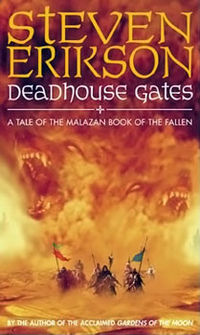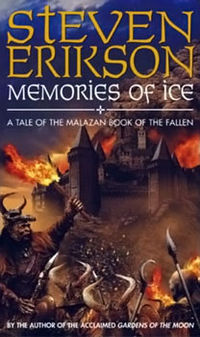The Malazan Book of the Fallen Series:
Gardens of the Moon (1999), Deadhouse Gates (2000), Memories of Ice (2001)
by Steven Erikson
One of the main hurdles epic fantasy has had to overcome has been making inroads with the literary crowds. However, in his piece “Easy Writers” for The New Yorker, Arthur Krystal observes that “the distinction between genre fiction and literary fiction has, of late, gotten less clear. Writers we once thought of as guilty pleasures are being granted literary status.” In a response to Krystal’s article, Lev Grossman wrote in a piece for Time that:
We expect literary revolutions to come from above, from the literary end of the spectrum — the difficult, the avant-garde, the high-end, the densely written. But I don’t think that’s what’s going on. Instead we’re getting a revolution from below, coming up from the supermarket aisles. Genre fiction is the technology that will disrupt the literary novel as we know it.
I think everyone can agree that good writing is good writing, irrespective of genre. Admittedly, for a while — particularly while I was in grad school — I’d been turning my nose up at sci-fi and fantasy (SF/F), ignoring the fact that the main reasons I wanted to become a writer in the first place were rooted in those two genres. Only upon closer inspection did I discover sub-genres, hidden within the minutia of those broad, overarching designations, particularly “epic-” or “high-fantasy” and “hard science fiction,” terms — similar to “surrealism” and “postmodernism” in that the practitioners of of each basically cringe at the labels — that showed me I was on the right track for discovering guilt-free SF/F reading that was also . . . dare I say it? . . . literary!
Gardens of the Moon opens with the armies of the Malazan Empire battling the free native city-states for dominance. It’s during an attempt by the Bridgeburners, one of the Malazans’ elite military units, to seize control of Darujhistan that we pick up the plotline. Epic events quickly begin to unfold from there.
Though it’s been mentioned around bookish corners of the Internet before, it certainly does bear repeating: do not expect much in the way of setup in Gardens of the Moon — Erikson sends you hurtling, face-first, into the Malazan universe where upon you land directly in the middle of the significant conflict I mentioned above. It can be a disorienting, even jarring experience. While the threat of an impending invasion by an oppressive empire seems like a bad thing, you still aren’t completely sure who to root for; you can’t definitively say who is “good” and who is “bad” (a distinction, like in Martin’s novels, that becomes increasingly more blurry as the series progresses); you are never totally sure of the stakes.
You just know shit is about to go down.
Let’s just get this part out of the way. Whether it’s fair or not (and n.b., I tend toward the latter), in 2013, it’s nearly impossible to discuss any epic fantasy series of significant length and scope without mentioning Game of Thrones. HBO’s Game of Thrones series has achieved something almost unthinkable, succeeding even where even Peter Jackson’s Lord of the Rings and The Hobbit had failed: it has actually made it cool to admit digging a fantasy series in public. The show is, of course, based on George R.R. Martin’s vaunted A Song of Ice and Fire novels (something worth mentioning just in case you aren’t already a longtime fan or haven’t found yourself instantly addicted yet.)
The overwhelming success of Game of Thrones/A Song of Ice and Fire has spawned a significant number of rabid new readers of epic fantasy who are looking for something to tide them over until Martin finishes the next book — perhaps you are one of those readers. However, it’s entirely possible that Ice and Fire will instead simply be a gateway drug toward discovering lit. that is even more awesome.
There are a number of alternatives, but three series invariably stick out the most on discussion boards and fan-sites alike: Robert Jordan’s Wheel of Time, Glen Cook’s Chronicles of the Black Company, and Steven Erikson’s Malazan Book of the Fallen. These series already have their own rabid fan-bases, flying sigils of House Jordan, House Cook, and House Erikson, all declaring superiority over House Martin and its elementary “Game of Thrones” (I’m paraphrasing here). Though, if you ask Erikson himself, he’ll tell you he’s not really competing with Martin because of a simple and almost universal truth: fans of epic fantasy can- and do- read as much of the genre as they are able.
Steven Erikson is an anthropologist and archaeologist by training — undeniably, a pretty great background for any writer, at least as far as developing creative material is concerned. But after reading the first three books in The Malazan Book of the Fallen series, it’s clear Erikson isn’t even remotely at a loss for creative material. The Malazan series is even considered by many “a high watermark in epic fantasy,” a sentiment voiced verbatim by genre veteran, Glen Cook (Chronicles of the Black Company, Dread Empire), where he adds: “. . .This marathon of ambition has a depth and breadth and sense of vast reaches of inimical time unlike anything else available today.”
Oh, and here’s a fun fact that may (or may not) appeal to fans of primarily literary fiction: Steven Erikson earned an MFA from the Iowa Writer’s Workshop, which helps to argue that MFA programs don’t solely churn out cookie-cutter work. But I digress . . .
We’re somehow ~900 words into a review without having discussed any of the actual, reviewable material. Consider the above merely a primer. Here comes the meat and potatoes, so buckle up!
Most of this is intentional. Erikson seems most concerned with presenting his story as if it were an historical record of the Malazan Empire, leaving room for scholars (i.e. readers) to glean whatever truth might be discernible while sifting through the ashes of an incredibly dark time. Erikson’s world is certainly not for the faint of heart. An old writing adage instructs would-be authors to torture their characters; it’s pretty safe to say that Erikson took this lesson in particular to heart. Environments and situations seemingly redefine the term “brutality.” You do not want to inhabit the Malazan world; it’d be far safer to observe it from afar…
Gardens of the Moon makes no apologies at all for what it wants to do and what it wants to be. You will be introduced to characters in droves, all of them unique with unique names often given to them by other characters (some to whom you may be introduced; others not) such as: Whiskeyjack, Tattersail, Hairlock, Quick Ben, Trotts, Mallet, Blend, Picker, Dujek One-arm, Sorry, Shadowthrone, The Rope, Hood, and far too many more to name off the top of my head. You are witness to a flying mountain that contains a city, sorcery of the highest order, characters so old that they require a new term for longevity — not least of which is Anomander Rake (who is purported to be 300,000 years old), one of the most badass characters in all of fiction. There is a lot here.
Magic? There is magic in these books, and it’s prominent, inventively conceived, and tactfully implemented. Where Game of Thrones masks the question of whether or not magic even really exists, and if so, then to what capacity?, the Malazan books put on an impressive display sorcery and power. Gods? Not only is there an incredibly elaborate pantheon of deities, the way in which they ascend to such status is pretty damn inventive and complex as well.
Even in book one, the reader is given a wonderful sense of vibrant and colorful cultures struggling to survive in a horrific and unforgiving world, a juxtaposition that feels both fresh and compelling. As is often the case — though never feeling like an overplayed trope — humans aren’t even the most interesting people in Erikson’s series. The various races of Jaghut, T’lan Imass, Forkrul Assail, Napan, Toblakai, Barghast, Wickan, and Rhivi peoples (again, to name a few) give the narrative a global sense of diversity and a history that is richer for it. The coolest race of characters, as far as I’m concerned, are the ebony-skinned Tiste Andii, led by previously-mentioned über-badass, Anomander Rake. Given their extreme longevity, they tend a little toward melancholy and apathy, but a life spanning hundreds of millennia would likely lead anyone toward heavy introspection. They are weary but also wise. There is a nobility in their stoicism that intrigues me.
As knotty and disjointed as Gardens of the Moon can seem at times, I’m starting to think — currently halfway through book four — that the series really couldn’t’ve begun any other way.
Women’s roles are also really refreshing. In fact, many of the most interesting and three-dimensional characters are females. Empress Laseen is not all she appears to be as ruler of Malaz, a truth that becomes more evident in the second and third books. Tattersail is an incredibly powerful mage as well as an incredibly human character. Sha’ik, seer and the leader of the Whirlwind apocalypse cult in the Holy Desert, Raraku, is the primary focus of book two (Deadhouse Gates), and has . . . interesting — not to mention sordid and complex — ties to the Empire. The Adjuncts to the Empress are female and more than up to the challenge of the role. I mention their adequacy only because women have often (unfortunately) been relegated to cardboard “damsels in distress.” Not so in Malaz! I haven’t even begun to scratch the surface of female depth in this series. . . .
Lastly, I think another appealing aspect of the Malazan series is that it’s complete. TOR released the tenth and final book of the series, The Crippled God, in 2011. As with The Wheel of Time and A Song of Ice and Fire, there’s no chance that the author might die before he finishes writing the series (as was the case with Robert Jordan, and some fear could end up being the case with G.R.R. Martin), or that the television spinoff will end before the final book is written; I’m looking at you, Game of Thrones!
***
Joseph Michael Owens is the author of the ‘collectio[novella]‘ Shenaniga
Tags: Joseph Michael Owens, Malazan Book of the Fallen, Steven Erikson




lol
this is dope
i’m rooting for more genre fiction on html giant
Thanks Erik, me too — hopefully we’re not the only ones!!
i’d also like to see more genre fiction reviews on the site. this series, however, i couldn’t get into. maybe i’ll give it another try. i really dug the first law series by joe abercrombie though – it makes a great summer read.
I’ve got The First Law trilogy high on my “to read” list!
With the Malazan series, it’s builds with a slow burn but then really hits its stride. That being said, it’s definitely not a small investment of your time. Gotta be picky with lengthy series!
well thanks again for the review i think i’ll give it another shot.
I liked these books a lot, though I don’t think the quality of writing is as consistently good as it is in Martin’s novels.
One interesting aspect of the series is its genesis as an RPG construct. The world and (I guess) at least some of its stories came together in a collaborative game-playing/fiction-making context; Ian Esslemont co-created (I guess) the world and has several novels that happen there of his own (which I haven’t read yet).
(I should say: the RPG angle is interesting to me partly because I’ve never played such a game and don’t easily imagine how they proceed. I only learned of this genealogy after reading (as I remember) the first seven of Erikson’s novels.)
If you’re especially interested in the female angle in fantasy fiction, J. V. Jones’s Sword of Shadows series is, to me, as well-done as Erikson’s series. Going by the paperback jacket covers of the first couple of those books of Jones’s, she had planned on the series being a trilogy (of which she’d already written one); in the writing, (I’m guessing) she decided the characters and stories gripped her enough for her to drop trying to end the thing after three books, because there’s a fourth and, at its end, no one-volume conclusion in sight (to me, anyway).
Alan Campbell also has a fine steampunk series called Deepgate Codex — quite different from the medievalistical fantasy series, like Martin’s and Erikson’s, that seem more popular, but worth checking out.
Also, I hear it said here often, but I still find it scarcely credible that writing apprenticeships in programs in which genre aspirations to literary quality are scorned are fairly common. If it’s a community where, who, Poe and Tolkien and Chandler and le Carré and Gibson are all categorically disparaged… are there likely to be many people there to talk to?
I mean, is there a reasonable argument against literary achievement in genre fiction?
Oh, not sure if you saw this, but Peter Tieryas Liu reviewed Iain M. Banks’s CONSIDER PHLEBAS last week for some more htmlgiant/genre flavorings! http://htmlgiant.com/reviews/consider-phlebas/
Duly/dually noted and added to Goodreads!!
I’ve heard the Esselmont books help flesh out the Malazan universe but aren’t quite as good/well-written. I’ll likely check them out once I finish the 10 Erikson books. The RPG angle is pretty cool because I can totally see how it’d work as a game (though more video than board game, for me).
Glen Cook’s books interest me too. They seem a little more light-hearted than Erikson’s, more tongue-in-cheek, but compelling nonetheless.
Word of Jordan’s series lagging in the middle has frightened me away for now…
I think it has to do with — and I’m willing to admit I’m possibly way off — more literary apprenticeships feeling like writing genre work somehow devalues not just the “literary/genre” work itself, but also somehow ALL literary work. It comes down to, in many cases, arbitrary labels that are clung to for the sake of preserving the familiar (again, my 2 cents).
Thanks for this, Joseph. I’m sold.
Great review Joe, really enjoyed reading this =)
It’s definitely challenging but also pretty rewarding as well [though I’m only just now about to finish book #4; I can confidently say I’m in for the long haul!]!!
Thanks, sir! Means a lot!!
i grew up playing game-master-based book-less and dice-less RPGs – it was basically story telling with no written parts rules. probably the nerdiest thing possible. something to do between painting 40k models and eating ramen.
there was always a game master, a time period, weapons and items
my friend had an older brother who was really really good at being game master
we would go on hikes and just tell the story, slaying imaginary enemies and solving totally invisible puzzles, etc.
This series bears re-reading, I’m currently re-reading book 5, where he really kicks into stride–the writing keeps improving even as the series grows. And there are layers (inc. metafictional layers) to chase.
Where it sits above Martin and others is that Martin forces the reader into a perspective — it changes throughout, but everybody is made to feel a certain way at a certain time. In Erikson’s work, the ambiguity is genuine, it forces you not to feel a certain way about a character, but to confront how you feel. This leads to lively argument amongst readers, but it can only add to the depth of the reading experience.
Man, I completely agree! I’ve checked out the “re-read” feature they have over at TOR.com for Gardens of the Moon, and the amount of stuff you [i.e. “I”] miss[ed] on the first read-through is pretty mind-blowing. While I do really like Game of Thrones / ASoIaF, the layered density of the Malazan universe really suits my palette a little more.
[…] writing a primer for the first 3 Malazan books over at HTML Giant, I’ve finished two more and have a decent start on the sixth book, The Bone Hunters. […]